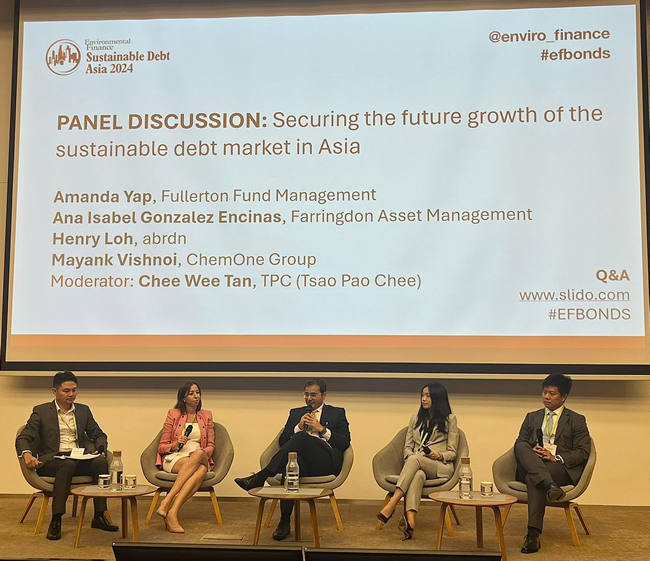Driving Sustainable Debt in Asia

11 June 2024
ChemOne Group Chief Financial Officer, Mayank Vishnoi, delivered an insightful presentation at the Sustainable Debt Asia 2024 conference organized by Environmental Finance (UK). The event, held at the SGX Auditorium in Singapore, brought together key industry leaders to discuss the future of sustainable debt in Asia.
During the discussion on “Securing the Future Growth of the Sustainable Debt Market in Asia”, Mayank highlighted several critical points.
Asia’s Market Potential
According to a report by Climate Bond Initiatives, sustainable bonds from the Association of Southeast Asian Nations (ASEAN), together with China, Japan and the Republic of Korea, accounted for 18.3% of the global market, totalling up to USD 2,352 billion at the end of Q4 2021 – making Asia the second largest market.
In 2024, Green, Social, and Sustainability-linked bonds (GSSSB) issuance in Asia-Pacific (APAC) is expected to rise by about 10%, reaching USD 260 billion, with South Korea, Japan, and China remaining the largest GSSSB markets in the region, accounting for over 75% of issuance. Mayank said that this showcases the significant growth and investment potential in the region.
Transparency and Standards
Emphasising the need for transparency, Mayank pointed out that clear project plans and financial figures are essential for both investors and bond issuers, and advocating for well-defined standard regarding energy transition and green-enabling sectors are crucial for fostering growth of sustainable debt in the region.
Technological Investments and Renewable Energy
Renewable energy is essential for boosting economic expansion and lowering carbon dioxide emission (CO2) to achieve carbon neutrality.
The Pengerang Energy Complex (PEC), of which ChemOne is the master developer, is leading by example by investing heavily in technology and utilising power from renewable sources. Upon completion, the PEC is set to produce 30% less carbon emissions than its competitors.
Climate Transition Strategy
Mayank also stressed that companies must develop clear climate transition strategies with identifiable and viable decarbonisation pathways.
According to Mayank, ChemOne is committed to a pragmatic approach in achieving the lowest carbon footprint for new projects, setting measurable targets for its operational businesses to ensure tangible progress in sustainability.
Regional Collaboration
Fostering regional cooperation is essential for improving the deployment of sustainable debt. Examples like the Climate/SDGs Debt Swap Mechanism or the Sustainable Debt Coalition, introduced by The United Nations Economic and Social Commission for Western Asia (ESCWA), foster sustainable debt management and promote cooperation among nations.
By sharing best practices, harmonising regulations, and creating cross border investment opportunities, Asian countries can collectively accelerate the development of sustainable infrastructure.